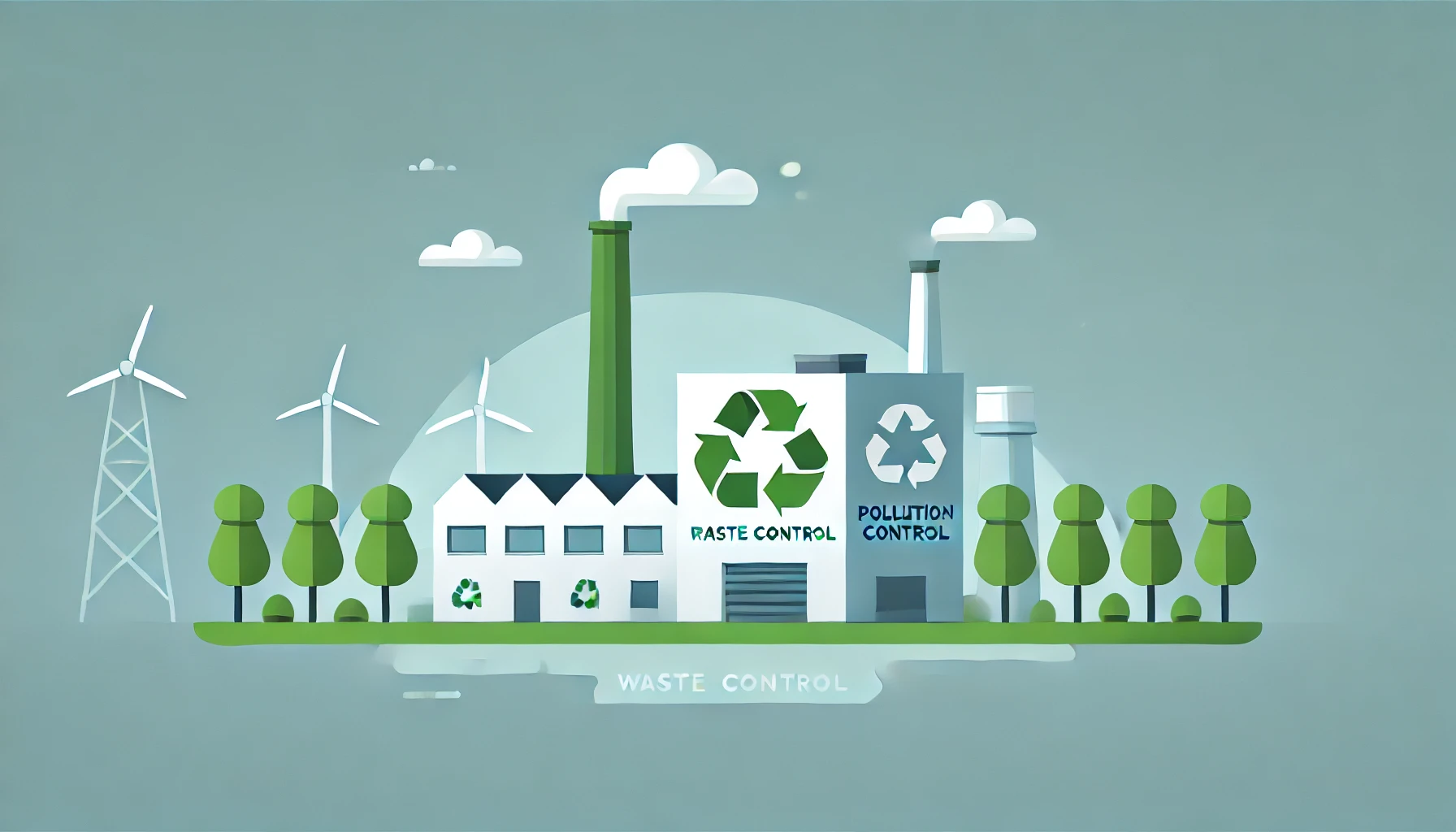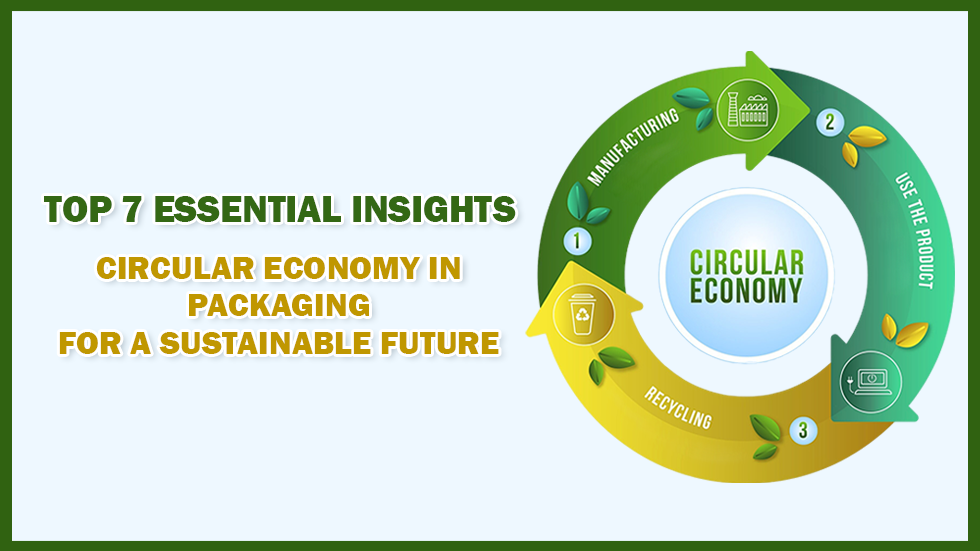As sustainability becomes a cornerstone of modern business strategy, the circular economy has emerged as a transformative approach to waste reduction, resource efficiency, and environmental responsibility. This concept is especially significant in the packaging industry, which faces increasing scrutiny over the waste it generates. Shifting from a linear “take-make-dispose” model to a circular economy offers a promising path for businesses to reduce costs, enhance brand reputation, and meet consumer demand for eco-friendly solutions. In this blog, we explore the top 7 insights into the circular economy in packaging, supported by data and real-world examples.
1. What is the Circular Economy in Packaging?

In simple terms, the circular economy reimagines the packaging lifecycle, aiming to keep materials in use for as long as possible, reducing waste and environmental harm. Instead of discarding packaging after one use, a circular economy encourages reuse, recycling, and the incorporation of sustainable materials into packaging designs. This approach not only benefits the environment but also reduces the demand for virgin materials, thereby lowering costs for businesses.
The circular economy could unlock $4.5 trillion in global economic growth by 2030, with packaging playing a pivotal role in this transformation.
2. Benefits for Businesses: Lower Costs and Higher Efficiency
The circular economy directly benefits businesses by promoting efficient use of resources and reducing waste management costs. By adopting recyclable or returnable packaging materials, companies can significantly lower their raw material expenses. Moreover, the use of durable and reusable packaging systems often requires less frequent production and transportation, leading to cost savings in logistics and material handling.
Example: Coca-Cola’s returnable glass bottle initiative in Mexico helped the company reduce packaging costs by 20% and align with local sustainability goals, all while enhancing brand loyalty.
3. Circular Packaging Enhances Brand Image and Consumer Trust
Modern consumers are increasingly concerned about sustainability, and brands that embrace circular economy principles stand to gain. By adopting eco-friendly packaging solutions, businesses can attract environmentally conscious customers, improve their brand reputation, and create differentiation in competitive markets.
Stat: A survey found that 73% of global consumers are willing to change their consumption habits to reduce their environmental impact, making sustainable packaging an essential brand consideration.
4. Waste Reduction and Pollution Control

One of the most immediate effects of a circular economy in packaging is the drastic reduction of waste and pollution. Unlike traditional packaging, which often ends up in landfills, circular packaging materials are designed to be recycled, reused, or composted. This reduces the environmental footprint of businesses and helps meet regulatory requirements aimed at reducing waste.
5. Innovations in Recyclable and Reusable Packaging
As businesses shift toward circular models, innovations in packaging materials and technologies have emerged. Packaging solutions now include recyclable aluminium, glass, and biodegradable plastics that are easier to process within recycling systems. Reusable packaging, such as refillable containers or returnable packaging, offers a way for businesses to significantly reduce packaging waste.
6. Digital Innovations Supporting Circular Economy in Packaging
The rise of digital tools like QR codes, smart labels, and blockchain technology is supporting the circular economy by providing transparency throughout the packaging lifecycle. These tools allow businesses to track the journey of their packaging, verify recyclability, and even encourage consumers to recycle more effectively.
Fact: Digital solutions could increase packaging recyclability by 20%, making it easier for businesses to participate in the circular economy while also educating consumers about sustainable practices.
7. Circular Packaging’s Impact on the Global Packaging Industry
The circular economy is reshaping the packaging industry on a global scale. As businesses prioritize sustainable materials and focus on resource efficiency, the demand for eco-friendly packaging is growing exponentially. For instance, companies in Europe and North America are increasingly adopting lightweight, recyclable materials to meet regulatory requirements and consumer expectations. This shift also drives innovation in packaging design, pushing the industry toward minimalism and the use of fewer resources.
Data: The global market for sustainable packaging is expected to reach $413.8 billion by 2027, growing at a 6.1% CAGR, as businesses worldwide adopt circular packaging models.
Conclusion: Circular Economy as the Future of Packaging
The circular economy is a game-changer for the packaging industry, offering solutions to both environmental challenges and business profitability. As more businesses adopt circular models, we will see a significant reduction in packaging waste, increased use of recyclable materials, and a greater focus on innovation. For companies looking to stay competitive and align with consumer demand, embracing the principles of the circular economy is no longer optional—it’s essential.
The packaging world is undergoing a transformation, and businesses that prioritize circularity will lead the way in sustainability, efficiency, and customer loyalty.
Need some amazing and eye-catching Packaging Solutions for your products?
Contact our packaging advisors today to learn more about our products and services, and to address any question/query.
Connect with us:
Email at sales@ajantabottle.com
Phone/Whatsapp: +91 9891098918
You can also shop from more than 500+ packaging solutions on www.ajantabottle.com – India’s first ever comprehensive packaging e-commerce portal.
For additional information, browse through our blog at https://www.ajantabottle.com/blog/ or subscribe to our latest updates through our social media channels,
*YouTube channel: https://www.youtube.com/c/Ajantabottle
*LinkedIn Page: https://www.linkedin.com/company/ajantabottle
*Facebook Page: https://www.facebook.com/glassbottleindia
*Instagram Page: https://www.instagram.com/ajantabottle/
*Google Business Profile Manager: https://g.page/r/CXTH9MKpe2DuEBM/review





